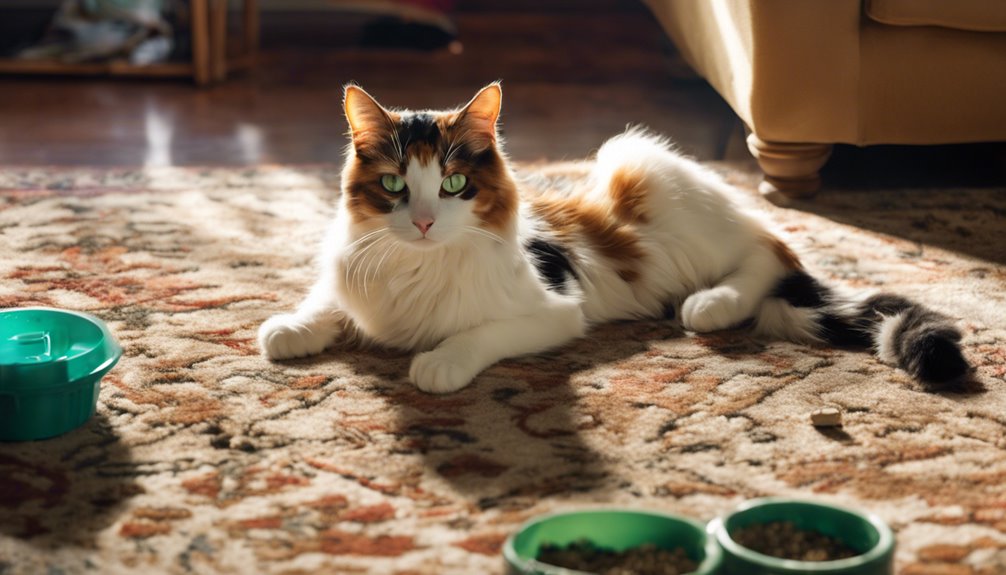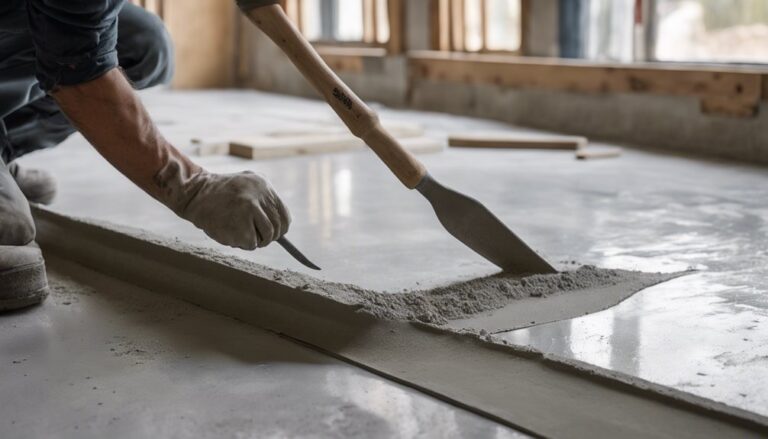If your cat keeps pooping on the floor, it might signal several issues. Health concerns, like gastrointestinal problems, can lead to irregular bathroom habits. Stress and anxiety also play a big role; changes in routine or environment can upset your cat. Additionally, litter box preferences—like cleanliness or type of litter—are essential. Your cat may have trouble accessing the box if it's not in a quiet, safe spot. Older cats may face mobility issues that hinder their litter box use. Understanding these factors can help you address the problem effectively. You'll find more insights on how to approach this issue.
Health Issues to Consider
When your cat suddenly starts pooping on the floor, it can be distressing for both you and your furry friend. This behavior may indicate underlying health issues, such as dietary changes or digestive disorders. Cats are sensitive creatures, and even minor alterations in their diet can lead to gastrointestinal upset. If you've recently switched foods or introduced new treats, your cat might experience trouble digesting these changes. Additionally, digestive disorders like inflammatory bowel disease can cause irregular bowel movements. It's essential to observe your cat's overall behavior and health. If this issue persists, consulting a veterinarian can help identify any serious problems and guide you toward a solution that restores harmony in your home. Your cat deserves to feel comfortable and healthy.
Litter Box Preferences
Understanding your cat's litter box preferences is essential, as these choices can greatly influence their bathroom habits. Cats are sensitive creatures, and the materials you choose for their litter box can make a significant difference. Experiment with various litter box materials, like clumping, non-clumping, or natural options, to see what your cat prefers. Additionally, litter box cleanliness plays a pivotal role; a dirty box can deter them from using it. Aim to scoop daily and change the litter regularly. Providing a well-maintained, appealing environment encourages your cat to use the litter box instead of the floor. By considering these factors, you're giving your cat the freedom to feel comfortable and secure in their bathroom habits.
Stress and Anxiety Factors
Although cats are often seen as independent creatures, they can experience considerable stress and anxiety that may lead to inappropriate elimination, such as pooping on the floor. Understanding the root of your cat's behavior is essential. Common anxiety triggers include changes in routine, loud noises, or the introduction of new pets. These stressors can overwhelm your cat, causing it to seek relief in ways that seem puzzling. It's important to observe your cat closely; changes in litter box habits often signal emotional distress. By identifying and addressing these anxiety triggers, you can help restore your cat's sense of security. Providing a calm environment and establishing a routine can greatly improve its behavior, fostering a happier, more relaxed feline friend.
Environmental Changes
When you move to a new home, your cat may struggle to adjust, leading to stress that can manifest in unexpected ways, like pooping on the floor. It's also important to take into account the litter box's location; if it's in a busy or uncomfortable spot, your cat might avoid it altogether. Understanding these environmental changes can help you create a more suitable space for your feline friend.
New Home Stress
Moving to a new home can be a significant upheaval for your cat, as they thrive on routine and familiarity. This adjustment period can trigger stress, leading to behaviors like pooping on the floor. Your cat's acclimation phase might be challenging, as they navigate unfamiliar sights, sounds, and smells. Here's a quick overview of common stressors during this time:
| Stressor | Impact on Cat | Tips for Management |
|---|---|---|
| New environment | Anxiety and confusion | Establish a safe space |
| Unfamiliar smells | Territorial stress | Use calming sprays |
| Changes in routine | Disruption of habits | Maintain feeding schedule |
| Loud noises | Startle response | Provide quiet areas |
| New people or pets | Social stress | Gradual introductions |
Understanding these factors can help you support your furry friend's adjustment.
Litter Box Location
Litter box location plays a crucial role in your cat's comfort and willingness to use it. If the box is hidden away or hard to reach, your feline might feel anxious and choose the floor instead. Consider placing the litter box in a quiet, accessible area where your cat can feel safe but still have privacy. It's also essential to maintain litter box cleanliness; a dirty box can deter use, leading to accidents. Regularly scooping and changing the litter will encourage your cat to use it consistently. Think about your cat's perspective—ensuring easy access and a clean environment can drastically improve their bathroom habits and overall well-being. Your cat deserves a space to feel secure and comfortable.
Territorial Marking Behavior
Although it might seem puzzling, cats often resort to pooping on the floor as a way to communicate their territorial boundaries. This behavior stems from their natural territorial instincts, and it reflects their need to assert dominance or mark their space. Understanding this can help you empathize with your cat's perspective.
| Behavior | Possible Reasons | Solutions |
|---|---|---|
| Pooping on Floor | Marking territory | Provide more litter boxes |
| Scratching Furniture | Establishing dominance | Use scratching posts |
| Aggressive Posture | Protecting territory | Gradual introductions |
| Excessive Grooming | Stress from territory disputes | Create a calm environment |
Recognizing these patterns in cat behavior can help you address their needs and reduce unwanted accidents.
Age-Related Problems
As cats age, they can experience a range of age-related problems that may lead to changes in their bathroom habits, including pooping on the floor. Common age-related diseases, such as arthritis or kidney issues, can make it difficult for your cat to reach the litter box comfortably. Additionally, cognitive decline might impair their ability to recognize the box or remember its location. This can be frustrating, but it's important to approach the situation with empathy. Regular check-ups with the vet can help identify these issues early, allowing you to adapt your cat's environment for their needs. Providing more accessible litter boxes or using softer substrates can support their adjustment, ensuring they maintain their dignity and comfort in their golden years.
Frequently Asked Questions
Can Diet Changes Cause My Cat to Poop Outside the Litter Box?
Yes, dietary changes can definitely lead to your cat pooping outside the litter box. When you switch their food, it can cause digestive issues, like upset stomach or diarrhea, which may prompt them to avoid the litter box. It's important to introduce new diets gradually, allowing their system to adjust. If the problem persists, consider consulting a vet to rule out any underlying health concerns that might be affecting their bathroom habits.
How Do I Know if My Cat Is Marking Territory?
Imagine your cat, poised like a tiny king, surveying its kingdom. If you notice it's scratching furniture or rubbing against walls, these are signs of territorial behavior. Scent marking often involves your cat depositing pheromones, which can manifest as urine or even feces in certain cases. Pay attention to where this happens; if it's consistent in specific spots, your cat's asserting its territory, expressing both confidence and a need for security.
Is It Possible for Cats to Have Behavioral Changes as They Age?
Absolutely, as cats age, they can experience various behavioral changes. Aging cats may develop behavioral issues due to health problems, cognitive decline, or changes in their environment. You might notice increased anxiety, altered social interactions, or even changes in litter box habits. It's crucial to monitor these changes closely and consult your vet if you're concerned. Understanding your cat's needs can help you provide a comfortable, nurturing environment as they age.
What Can I Do to Clean Cat Poop From Carpets Effectively?
Imagine this: you're in a 1950s diner, and you see a mess that needs tackling. To clean cat poop from carpets effectively, start by blotting the area with paper towels. Then, use a cleaning solution specifically designed for pet stains. For stain removal, mix equal parts vinegar and water, apply it to the stain, and blot again. Rinse with water afterward. It's vital to make certain your carpet's free of odors so your cat doesn't return.
How Often Should I Clean the Litter Box to Prevent Accidents?
To maintain a happy cat, you should prioritize litter box maintenance by cleaning it at least once a day. This cleaning frequency helps keep the box fresh and encourages your cat to use it consistently. Cats are sensitive to odors, and a dirty box can lead to accidents. By being proactive in your cleaning routine, you not only promote your cat's well-being but also create a more pleasant environment for both of you.




